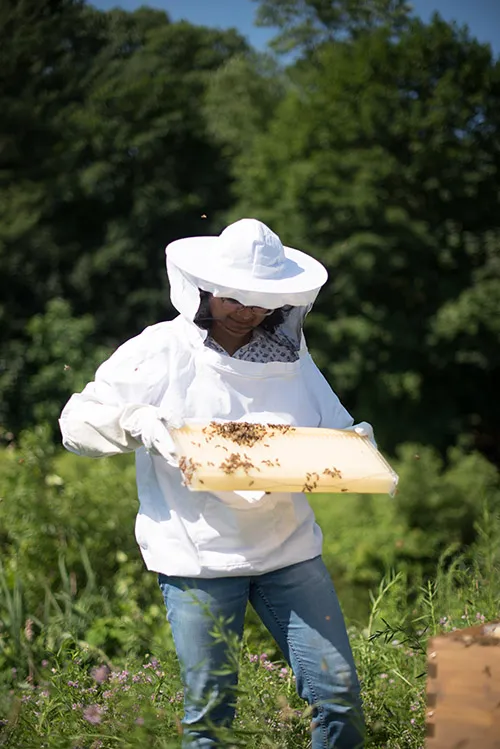The Path to Carbon Zero
The past, present, and future of sustainability at Bryn Mawr College.
Sustainability has always been important to Bryn Mawr, and it found in President Wendy Cadge a like-minded collaborator.
“I am committed to accelerating the College’s sustainability work over the next five years,” Cadge said in her 2024 inaugural address. “To help catalyze Bryn Mawr’s work to date, we will be increasing resources to support faculty, staff, and students working on these issues and create a new position in 2025 that is 100 percent focused on sustainability at the College and in our local communities.”
Enacting sustainable changes that truly move the needle can take time. The College’s goal of attaining carbon neutrality by 2035 has been years in the making, through changes both big and small, and has involved collaboration between students, faculty, and staff on changing lightbulbs, planting trees, and more.
“The time is now,” said Chief of Staff Shannon Kearns, who helped lead the search for the College’s new director of sustainability and environmental action. “It’s something we have to address, especially given our mission around creating leaders of the future.”
What does the path to carbon zero look like at Bryn Mawr? Here are some of those steps, from the early initiatives to what is on the horizon.
2008 Going Green
In 2008, the College joined the American College & University Presidents’ Climate Commitment, a network of higher education institutions committed to promoting sustainability. Since its first greenhouse gas report in 2008, Bryn Mawr has reduced emissions by 56.4 percent.
2010 SETTING THE TABLE
In 2010, the dining halls went tray-less. Associate Director for Administration, Dining Services Richard Clow estimates that thousands of gallons of water are saved by not cleaning trays. Food is eaten off ceramic plates with stainless steel flatware, cutting down on waste.
2010 WASTE NOT
“The biggest challenge has always been with composting,” Clow says. Because some composting companies have closed or shifted to residential-only, the College has changed vendors a couple of times but remains committed to composting food waste in the dining halls and Wyndham Alumnae House.
2014 WIND POWERED
The College has been purchasing its electricity with Renewable Energy Certificates from wind power since 2014. It started with 50 percent of electric usage, and increased to 100 percent the following year. In 2022, the College began prioritizing the sourcing of green electric energy from the most local sources available.
2017 “LEED”ING THE WAY
The renovation of Park Science Building kicked off in 2017 and was designed to meet LEED silver standards. That included integrating features such as LED lighting, high-efficiency HVAC equipment, and rainwater harvesting.
2018 BETTER CHOICES
Since 2018, all dining halls and cafés have featured directly traded coffees, meaning the coffee growers receive a fair price for their coffee and negotiate directly with our suppliers. The creation of a plant-based hot bar called RootED in New Dorm Dining Hall offered minimally processed options to support the growing number of vegetarian and vegan students.
2021 SUSTAINABILITY TO-GO
OZZI containers—recyclable and reusable—were introduced in 2021 to replace disposable to-go containers. Students have virtual tokens on their OneCard that allow for the check out (and require the return) of the durable compartmentalized containers.
2022 REFORESTATION
More than 144,625 trees have been planted in Altoona, Pa. by the College. The goal is to plant 400,000 trees on the legacy mine land that was formerly deforested for coal extraction, to fight erosion in the area and offset the College’s carbon footprint.
2023 ELECTRIFIED RIDE
In spring 2023, Bryn Mawr replaced two utility vans with electric versions. In 2024, the Bi-Co unveiled a new electric Blue Bus, partly funded by a Commonwealth of Pennsylvania Alternative Fuels Incentive Grant suggested by Professor Victor Donnay’s Math Modeling and Sustainability class. As of spring 2025, the College now has six electric vehicles and the goal of replacing the rest of the fleet with electric vehicles over time. EV car chargers have also been installed around campus in the Radnor and Erdman parking lots.
2024 SEPTA FOR STUDENTS
The College joined SEPTA’s Key Advantage UPass program, providing a free transportation pass to encourage students to explore the region on SEPTA’s bus and train lines.
2025 What’s the Buzz?
What’s next for sustainability at Bryn Mawr? In May, Cadge announced the hiring of Neha Sood as the new director of sustainability and environmental action. “There was so much happening, but nobody to make the connections,” Kearns says. “We feel like we needed this person to make these changes institutional.”
Sood joins Bryn Mawr following seven years in the sustainability office at Rochester Institute of Technology. She oversaw the implementation of RIT’s Climate Action Plan and developed programs to engage campus stakeholders.
Also in May, Bryn Mawr welcomed bees back to campus with three nucleus hives, with the plan to eventually host five to 10 colonies. The office of Civic Engagement is offering interested students the opportunity to learn with a local beekeeper and work in the apiary.
Published on: 06/09/2025

